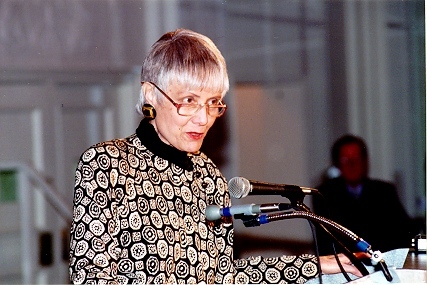
Comments by Representative James A. Leach upon the Introduction of Loret Ruppe at The 35th Anniversary of The Peace Corps
Comments by Representative James A. Leach
Upon the Introduction of Loret Ruppe at The 35th Anniversary of The Peace Corps
The Mayflower Hotel
Washington, D.C.
March 1, 1996
Father Hersberg, Secretary Shalala, Senator McGovern, Sargent Shriver, Ted Sorenson, Harris Wofford, ... wow ... I don't suspect there will be a meeting in any room in America for the remainder of this century with any six people who symbolize more the greatness of the American liberal tradition.
As for the Peace Corps volunteers we pay tribute to this evening, I can't think of an institution of governance established in this or any century that reflects greater idealism, or has been more successful than the United States Peace Corps.
Centuries hence a historian might suggest that there have been four great debates in our history.
The first was at the founding of the Republic and centered on the question of whether society could be created on the basis of the rights of man.
The second, which covered more than a century and included a Civil War and suffragette movement, was all about definitions: whether rights applied to people who weren't male or pale.
The third, which has sprung in particular from the bombs dropped on Hiroshima and Nagasaki, involves the question of whether society itself has rights and whether there is a right to survival, to peace.
The Peace Corps symbolizes many things, but most of all it is the engagement through action at a global level in these last two debates.
As an institution, the Peace Corps is in constant transition. Volunteers come and go with two year terms. Staff serves a maximum of five.
What has been a constant is the vision and the idealism.
What has also been a constant is the remarkable quality of the people associated with the Peace Corps, none more so than its longest serving director, Loret Miller Ruppe.
As all of you know, Loret is a woman of unflagging spirit and uncompromising integrity who brought new stature to the Peace Corps at a time when its future was clouded by ill political winds.
Loret now and again tells the story of her first trip to the White House when she was introduced to the staff member she'd been assigned as her agency liaison. He told her that he'd recommended to President Reagan that the Peace Corps be abolished. She requested and got a new contact person.
The Peace Corps has had its share of institutional difficulties. Peace, while an imperative of every religious creed, is a shockingly controversial and often partisan subject.
This phenomenon evidenced itself early in the Nixon years. President Nixon was clearly embarrassed by inheritance of this Kennedy/Shriver treasure and frankly apprehensive that America's best youth would come home committed to a non-realpolitik internationalism that might not suit his party's banner. But he didn't have the political capital to bury the institution, so he chose to hide it, by reducing its size and institutionally downgrading its status and putting it under a newly created umbrella agency called ACTION.
Some of you might recall that the tradeoff a decade later for allowing a Bush Republican to head the institution was the placement of a combative ideologue at the head of ACTION to keep the Peace Corps under wraps.
Noting the awkwardness of Loret's plight, a young Republican member of the Foreign Affairs Committee quietly introduced amendments calling on the Peace Corps to double its size to 10,000 volunteers, instead of retrench as budget proposals then envisioned, and to return the Peace Corps to the status of an independent agency. I can say with confidence that there are few mischievous acts of partisan insubordination this Republican is prouder of.
Anyway, in the independent spirit of the Peace Corps, let me introduce a heroine, the mother of a volunteer, the always Honorable, always spirited Loret Ruppe, who at a critical moment in the history of the Peace Corps, asked not what her political party's weaknesses were, but what she could do to some of her President's advisors.